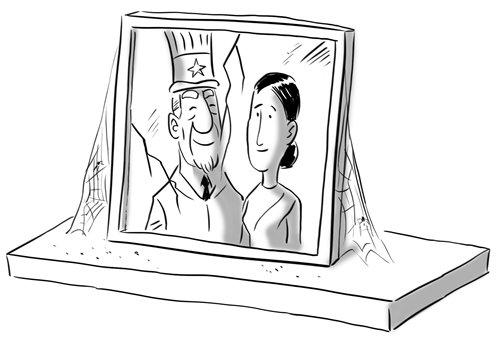It has been two months since fresh tensions were triggered over the Rohingya issue on August 25. The past months saw increasing differences on perception of the crisis between the US and Western media, and the Myanmar government.
In the most hard-hitting step taken by the US so far against Myanmar, Washington announced it was considering targeted sanctions on October 23, with measures taken to withdraw invitations to senior military members of Myanmar to visit the US and end their travel waivers. While former US president Barack Obama sought to lift sanctions on Myanmar a year ago, now the Trump administration has begun to re-impose sanctions on the pretext of the ethnic crisis that has seen tens of thousands rendered homeless.
Sanctions are a direct result of America's dissatisfaction and resentment toward Myanmar, which has its roots in Washington's hopes in the government turning to discontent.
The US government placed great hopes in the Asian nation after the National League for Democracy (NLD) led by Aung San Suu Kyi won the general election in 2015. Suu Kyi is seen as a hero of human rights and democracy by Western media. From the perspective of the West, she has made outstanding efforts in promoting democracy in Myanmar and her winning the Nobel Peace Prize sent ripples across the Western world. Her significant influence on the US government and people is strong so as to make Myanmar expert David Steinberg comment: "No living foreigner has shaped contemporary US attitudes toward a single country more than Aung San Suu Kyi."
Americans think Suu Kyi, who is capable of influencing the Myanmar regime, should raise her voice over human rights of the Rohingya. Besides, Western media links eliminating discriminations against the Rohingya people with Myanmar' democratic reforms, believing the former is an indispensable component of the latter.
According to the US establishment, "sanction" has a strong ideological element and that has been the case with the sanctions on Myanmar. The US political class thinks only a united, peaceful, prosperous, democratic and human rights-respecting Myanmar will suit the US' national interests.
After Suu Kyi came to office, the US began to support her and sought to lift sanctions out of expectations. However, American hopes were dashed by the tepid response of the NLD government.
In addition, Western media has led criticism of the treatment of the Rohingya minority. Before she came to office, the New York Times once criticized Suu Kyi over the Rohingya issue, saying she remained shamefully silent, without specifically condemning acts of violence. After she assumed office, the gap between the US government's expectations and the activities of the NLD government became ever larger with Washington becoming more dissatisfied.
In February, a UN report said Myanmar's armed forces had raped and slaughtered Rohingyas and resorted to "ethnic cleansing." Although the NLD government and Suu Kyi have denied allegation several times, Western media thinks she is evasive on the issue.

Once again, American and other Western media outlets expressed disappointment and resentment over Suu Kyi's attitude. Now, more Rohingya refugees have emerged because of terror created by the Salvation Army of the Rakhine State. The NLD government has announced its policy in a special speech and taken a series of measures according to proposals of former UN secretary-general Kofi Annan who leads the Advisory Commission on Rakhine State, including citizenship verification, talks with Bangladesh over Rohingya refugees and allowing foreign journalists to visit Rakhine State.
However, the problem persists, leading to Western media continuing to pressure Myanmar, and intending to label the actions of the Myanmar government "ethnic cleansing." As differences rise, the US has ratcheted up criticism of Suu Kyi. For example, Bob Corker, the Republican chairman of the US Senate Committee on Foreign Relations, chided Suu Kyi for "dismissiveness" toward the sufferings of the Rohingya people and called for a "policy adjustment" toward Myanmar.
Selective American sanctions on Myanmar are not only an expression of disappointment toward Suu Kyi, but also the beginning of a possible policy of adjustment, the extent of which is unclear. After all, Trump apparently doesn't pay as much attention to Myanmar as Obama. And the US thinks it is the Myanmar military that calls the shots in Rakhine State. It can be safely said that fresh sanctions on Myanmar, if imposed, will not have a major effect on US-Myanmar ties.
The author is a research fellow with the Charhar Institute and the College of ASEAN Studies at Guangxi University for Nationalities.
Source: Global Times, October 30, 2017.